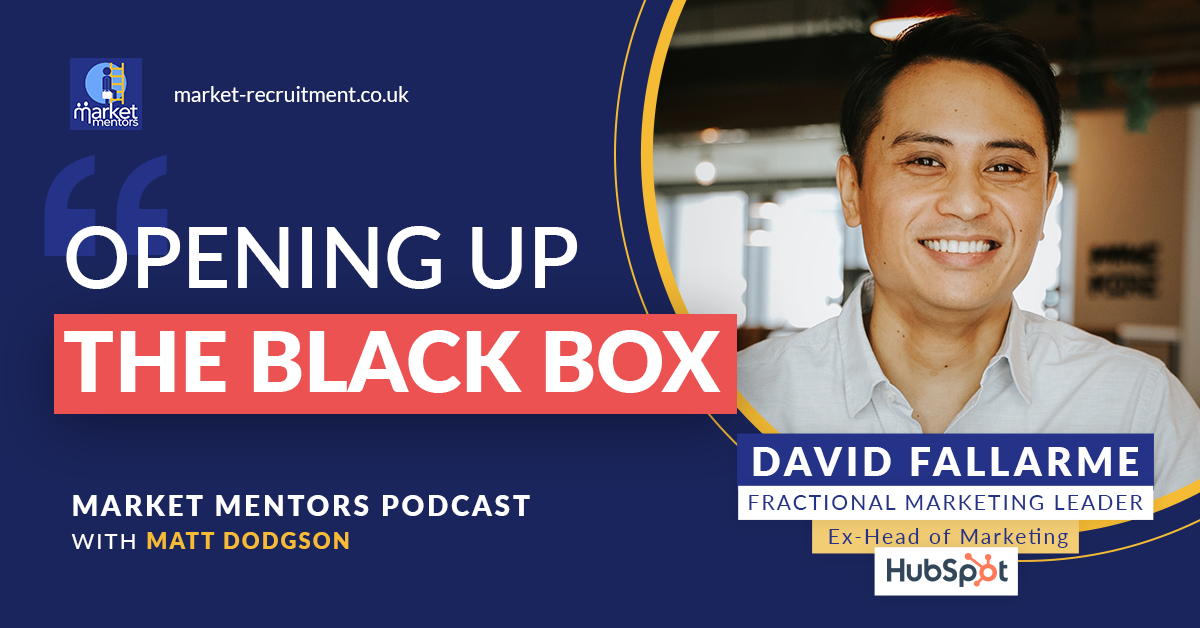
Whether we’re in a recession right now or not is a debate for people who are far more informed than me.
However, what can’t be denied is there’s been a shift in a lot of technology companies recently from a ‘grow at all costs’ mentality to one that’s focussed on ‘efficient growth’.
Inevitably that shift brings about change, which could mean redundancies or reduced budgets.
But with every headwind there comes a tailwind and for every challenge there’s an opportunity.
So how should B2B marketers approach marketing in a recession?
I was delighted when David Fallarme took up my offer of tackling this question head on. And as someone who worked at HubSpot during the last downturn, he’s got some great advice for us.
Who they are: David Fallarme – Fractional Marketing Leader, ex-Marketing Director at OnDeck and Head of Marketing, Asia at HubSpot.
A bit of background: David has built and led marketing teams at small and large companies, from public companies to venture backed startups. With experience across B2C and B2B, David has always been drawn to B2B because of the challenge of marketing complex solutions to a wide range of buyers.
Where you can find David:
Connect with David on LinkedIn
During a recession, budgets across the board are generally reduced, but relative to cutting salaries, cutting a marketing budget is easier. It’s why one of the most common reactions of CEOs and CFOs during a recession is to cut the marketing budget.
But whatever your company decides to do, it’s important for marketing leaders to resist the temptation to cut the marketing budget too much.
Instead, look for some ways you can reduce the budget in a way that doesn’t impact revenue.
David says there are a few areas of direct value you can immediately realise. There are three things in particular he would do to reduce the marketing budget in a recession:
“In my opinion, branded search is one of the greatest scams of the 2010s. It’s like Google is saying you have to bid on your own keyword. It doesn’t make any sense. If you really think about it, somebody’s searching for you already so you’re just paying for that click.Whenever I consult for a company now, there’s anything from $10 to $30K a month going to branded search.”
“The second thing is look at your tools budget. Every marketing team has a bunch of SaaS tools in their stack. I guarantee you 10 to 20% of those are not being used to the fullest extent. Cut or consolidate those and that’s immediate savings.”
“The last thing I would say is look at your freelancers and the agencies you’re using. Sometimes you have people on retainer you didn’t even know that you still had.”
If your company needs to save money, there’s clearly no point in cutting budget from certain activities and then re-investing the same amount in other areas.
But that doesn’t mean that you can’t re-invest some of what you’ve saved.
After all, if all your competitors are reducing their marketing budget too, then it suggests there might be an opportunity there.
As the famous quote goes, ‘when everyone zigs, zag.’
And this is exactly what David did during his time at HubSpot during the COVID pandemic. He goes on to explain.
“One of the things that I really love that we did at HubSpot was to recognise that budgets are smaller, people are more conservative, they’re more afraid of investing in a solution that would be a significant budget hit.
“And so we just invested in education. And to turn the headwind into a tailwind we did a series of webinars about how to deal with recessions, and what other companies are doing.”
HubSpot has a very clear understanding of its ideal customer profile (ICP). But the landscape had changed.
To understand how, the marketing team at HubSpot went back to their customers and spoke to them.
After this customer discovery, they rethought all of their messaging across web, social, outreach and in their offers to reflect the changes.
This is where the opportunity lies for savvy marketers.
Fundamentally, the marketing metrics you track shouldn’t change during a recession. However, the metrics you do track will be under a lot more scrutiny, so it’s important to reaffirm what you are tracking.
One area to be more brutal is with your pipeline. Have deals stagnated? Can you clear out those that are unlikely to convert? Doing this will give you a more accurate sense of what’s likely to close.
The framework that David uses to track metrics is the triple A framework.
He explains:
“The triple A framework that I use is awareness, affinity and acquisition. It breaks open the black box of how you get a qualified lead (QL) and how you build a pipeline. It helps you identify where the greatest areas for improvement are and where you can make the most progress during a recession. It gives you things to improve even if people aren’t buying.”
“Awareness is stuff like your social following, page views. The things that we traditionally think of as vanity metrics are actually very important. And I think more and more people are realising that. Are you able to invest in those or increase those in a productive way?”
“Your affinity metrics are engagement, so newsletter subscribers, open rates on the things you send to people, things that show that people are coming back to you and are building trust and engagement.”
“Acquisition metrics are QLs, how many demo requests you sent and so on.”
During these times it’s also worth keeping an eye on your time to close metric. Although David suggests that because this is a lagging indicator it’s better to focus on things you can influence in a positive way.
Subscribe to our fortnightly newsletter to hear about our latest podcasts, blogs, career advice & jobs.